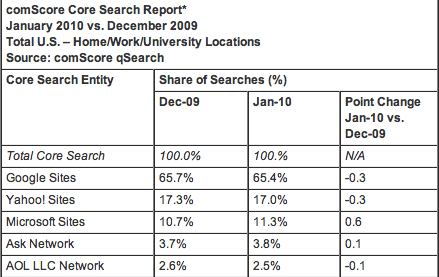 Google’s become so synonymous with search that many SMB owners and managers think only of winning a Google page one rank for their business — if winning search traffic occurs to them at all. But while Google’s undoubtedly the most prominent search engine, controlling nearly 66 percent of all searches in the U.S. according to comScore, service managers would be foolish to ignore the competition.
Google’s become so synonymous with search that many SMB owners and managers think only of winning a Google page one rank for their business — if winning search traffic occurs to them at all. But while Google’s undoubtedly the most prominent search engine, controlling nearly 66 percent of all searches in the U.S. according to comScore, service managers would be foolish to ignore the competition.
That’s the gist of Darion Miller’s latest post on The Service Coach’s blog. Miller cites several reasons why prudent managers should take a more holistic approach to search marketing than simply pining for a Google page one result. For one, search engines are fickle. Even Google. They’re constantly changing their algorithms, so there’s no secret sauce to guarantee a page one result (which may not be a page one tomorrow).
Miller points out that it’s also important for managers to understand their customers — the very people they hope to jump out to online. People in the same demographic tend to use the same search engines , so it’s important for managers to consider the entire swath of their customer base when trying to win online. Miller adds: “The reason why it’s important to understand your searcher demographic is that each search demographic has a majority on a specific search engine.” Twenty somethings search differently than retirees — and it’s important to not neglect either as they’re both (potentially) paying customers.

Google may control the majority of searches, but Yahoo and Microsoft — the two companies partnered last year with Yahoo surrendering search to Microsoft’s Bing platform — combine for about 28 percent of all search queries. That’s no small number considering Americans searched 15.2 billion times in January 2010 alone.
Miller also stresses the importance of social media searches, especially as mobile continues to spread and with Facebook dethroning Google and the most-visited site.
Miller predicts that social (Facebook, Twitter, social search engines) will account for a significant percentage of a service company’s search traffic for those with a social media presence.
Every social media site has a search function for the entire site. However, social media search queries are now showing up in popular search engines like Google and Bing. What’s even more interesting is the advent of new social media search engines. These real time social media search engines allow the user to search terms in social media in real time unlike the traditional search queries.

Share this: